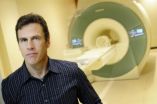(Press-News.org) CHICAGO — A breast cancer vaccine already shown to elicit a powerful immune response in women with varying levels of HER2 expression has the ability to improve recurrence rates and is well tolerated in an adjuvant setting, according to new research from a clinical trial led by researchers at The University of Texas MD Anderson Cancer Center.
The findings, released today, will be presented on Monday, June 4 in an oral presentation at the 2012 Annual Meeting of the American Society of Clinical Oncology (ASCO). It builds on previous research showing the vaccine, known as AE37, to safely and effectively raise immunity against human epidermal growth factor receptor 2 (HER2) – an oncoprotein that promotes tumor growth and is expressed to some extent in 75-80% of breast cancer tumors.
The researchers found that patients who received the vaccination had an estimated recurrence rate of 10.3% compared to 18% in the control group at a median follow up of 22 months. This represented a 43% reduction in the risk of recurrence.
"The vaccine educates the immune system to recognize HER2 as an invader," said Elizabeth Mittendorf, M.D., assistant professor in the Department of Surgical Oncology at MD Anderson and the trial's national principal investigator. "By introducing it into women who have had breast cancer, our goal is to instruct the immune system to immediately recognize any recurring cancer cells and orchestrate an attack."
Building a Powerful Vaccine
The AE37 peptide vaccine used in this study is a hybrid modified to increase its potency in generating an immune response specific to cancer cells expressing HER2. It consists of a fragment of the HER2 protein (AE36), a MHC Class II epitope, linked to an Ii-Key peptide. Together, they work to stimulate a robust CD4+ T cell response, prompting the components of the immune system to seek and destroy tumor cells.
To help T cells better recognize AE37, researchers also paired the vaccine with an immune stimulant known as granulocyte/macrophage colony stimulating factor (GM-CSF). The vaccine is injected under the skin similar to a tetanus shot. The initial series consists of inoculations given monthly for six months followed by four cycles of boosters every six months.
Preventing Breast Cancer Relapse
Most experimental drugs are first evaluated in patients with metastatic disease, when tumors have undergone drastic changes, including immunoescape – a mechanism that allows tumor cells to evade elimination by the immune system. "There's very little chance a single peptide vaccine like AE37 will overcome a tumor at this stage of disease," said Mittendorf. "For this reason, it's more realistic to use the vaccine to prevent recurrence rather than to treat a large mass of already present cancer cells."
In the Phase II randomized clinical trial of 201 disease-free breast cancer patients, 103 women received the AE37 peptide plus GM-CSF adjuvantly; a control group of 98 patients received GM-CSF alone. All patients had varying levels of HER2 expression.
Results showed that the vaccine was well tolerated in the patients and toxicity was minimal; short-term side effects included redness at the injection site, flu like symptoms and bone pain. In addition to being consistent with earlier data which showed a significant immune response to the vaccine, the study also revealed how the vaccine affects recurrence rates.
The vaccine appears to prevent recurrence and work in women with any level of HER2 expression. Further, the findings draw parallels to other vaccines we now have advanced to later phase trials, Mittendorf said. MD Anderson currently has three different types of HER2-based peptide vaccines in various stages of testing and development. AE37 is the only one that targets CD4+ T cells.
"Off the Shelf" Capability
Among the benefits of a peptide-based vaccine are that it's simple to produce and administer, and that it can be easily exported to the community compared to other available vaccines. Mittendorf noted whereas dendritic cell vaccines require patients to go to the hospital for a large blood draw that is shipped to a processing center – a complicated and expensive process – peptide vaccines can be administered to patients "off the shelf."
The vaccine possibly offers advantages to today's adjuvant therapies as well. "Adjuvant therapies currently used for breast cancer are taken ongoing. Otherwise, their effect to block cancer development is diminished," said Mittendorf. "In theory, once a response is generated with immunotherapy, we can expect a longer lasting therapeutic effect without repeated dosing.
"This is an exciting time for immunotherapy as we transfer knowledge from the lab to clinic. There's a renewed enthusiasm to manipulate the immune system therapeutically – from vaccines and antibodies to combining these modalities and improving response rates."
The findings will be presented at ASCO by Timothy J. Vreeland, M.D., resident at Brooke Army Medical Center. The trial is funded in part by Antigen Express, the company that licenses the vaccine technology. Based on this study, Antigen Express plans to apply for a special protocol assessment from the US Food and Drug Administration to continue Phase III research needed on the vaccine.
###
Other researchers contributing to the study include: Diane Hale, M.D., Alan Sears, M.D. G. Travis Clifton, M.D., Nathan Shumway, D.O. and George Peoples, M.D., from Brooke Army Medical Center; Sathibalan Ponniah, Ph.D., from Uniformed Services University of the Health Sciences; and Sonia Perez, Ph.D., Michael Papamichail, M.D., Ph.D. and Alexandros Ardavanis, M.D. from Saint Savas Cancer Hospital, Cancer Immunology and Immunotherapy Center in, Athens, Greece.
END
A decade after the start of the wars in Afghanistan and Iraq, studies have shown that the incidence of post-traumatic stress disorder (PTSD) among troops is surprisingly low, and a Harvard researcher credits the drop, in part, to new efforts by the Army to prevent PTSD, and to ensure those who do develop the disorder receive the best treatment available.
In an article that appears in the May 18 issue of Science, Professor of Psychology Richard J. McNally says there is reason for cautious optimism when it comes to the prevalence of PTSD. While early estimates suggested ...
WHO: Renee Weber is VP, Consumer Strategy and Research at The Marketing Store Worldwide, one of the largest brand activation, loyalty, and youth and family marketing agencies in the world, leads youth research for consumer products, toys and promotional marketing efforts working with major brands.
Renee is an expert in youth and family. At The Marketing Store, her primary responsibilities are to provide more in-depth understanding of youth/families, youth promotions/product development, help lead consumer-based product innovation and establish The Marketing Store Play ...
Picture a turtle the size of a Smart car, with a shell large enough to double as a kiddie pool. Paleontologists from North Carolina State University have found just such a specimen – the fossilized remains of a 60-million-year-old South American giant that lived in what is now Colombia.
The turtle in question is Carbonemys cofrinii, which means "coal turtle," and is part of a group of side-necked turtles known as pelomedusoides. The fossil was named Carbonemys because it was discovered in 2005 in a coal mine that was part of northern Colombia's Cerrejon formation. The ...
David Cerami, CKBR (Certified Kitchen & Bath Remodeler), owner of Hometech Renovations, Inc. & Let's Face It, Inc., has been selected by Remodeling magazine to join the remodeling Big50. The Big50 awards were presented at a gala dinner at the Remodeling Leadership Conference in Baltimore, MD on May 11, 2012. The 2012 Big50 winners are featured in the May issue of remodeling, a national trade publication read by more than 80,000 professional remodeling contractors.
Each year since 1986, the remodeling Big50 inducts 50 owners of remodeling companies that have ...
Playing make-believe is more than a childhood pasttime. According to psychologists, it's also crucial to building creativity, giving a child the ability to consider alternative realities and perspectives. And this type of thinking is essential to future development, aiding interpersonal and problem-solving skills and the ability to invent new theories and concepts. That has been shown to be a component of future professional success in fields from the arts to the sciences and business.
But can creativity be taught? Prof. Nira Liberman ofTel Aviv University's School of ...
New research by psychologists at three North American universities, including the University of British Columbia, finds that parents experience greater levels of happiness and meaning from life than non-parents.
The findings, which contrast sharply with recent scholarship and popular beliefs, suggest that parents are happier caring for children than they are during other daily activities. The research also suggests that the benefits of parenthood appear more consistently in men and older and married parents.
To be published in the journal Psychological Science, the ...
People have increasing opportunities to participate in genetic testing that can indicate their range of risk for developing a disease. Receiving these results does not appreciably drive up or diminish test recipients' demand for potentially costly follow-up health services, according to a study performed by researchers at the National Institutes of Health and colleagues at other institutions.
The study in the May 17, 2012 early online issue of Genetics in Medicine was done by investigators with the Multiplex Initiative, a multi-center collaborative initiative involving ...
Roanoke, Va. – Fool me once, shame on you. Fool me twice, shame on my parahippocampal gyrus.
Scientists at the Virginia Tech Carilion Research Institute have found that suspicion resides in two distinct regions of the brain: the amygdala, which plays a central role in processing fear and emotional memories, and the parahippocampal gyrus, which is associated with declarative memory and the recognition of scenes.
"We wondered how individuals assess the credibility of other people in simple social interactions," said Read Montague, director of the Human Neuroimaging Laboratory ...
52,000 bluebells were delivered to Sherwood Forest this week which are being planted along the entrance drive. Since 8th May, Center Parcs Conservation Rangers at Sherwood Forest have been planting the bluebells which guests will be able to see when arriving for their forest breaks and departing.
Grown from their seed for three years, the 13,000 pots of native English bluebells filled 26 trollies. They were transported this week from Norfolk, travelling more than 130 miles to their new home at Center Parcs Sherwood Forest.
Chosen for their rarity in ancient woodlands ...
HOUSTON – An experimental drug targeting a common mutation in melanoma successfully shrank tumors that spread to the brain in nine out of 10 patients in part of an international phase I clinical trial report in the May 18 issue of The Lancet.
The drug dabrafenib, which targets the Val600 BRAF mutation that is active in half of melanoma cases, also cut the size of tumors in 25 of 36 patients with late-stage melanoma that had not spread to the brain. The drug also showed activity in other cancer types with the BRAF mutation.
"Nine out of 10 responses among patients with ...


